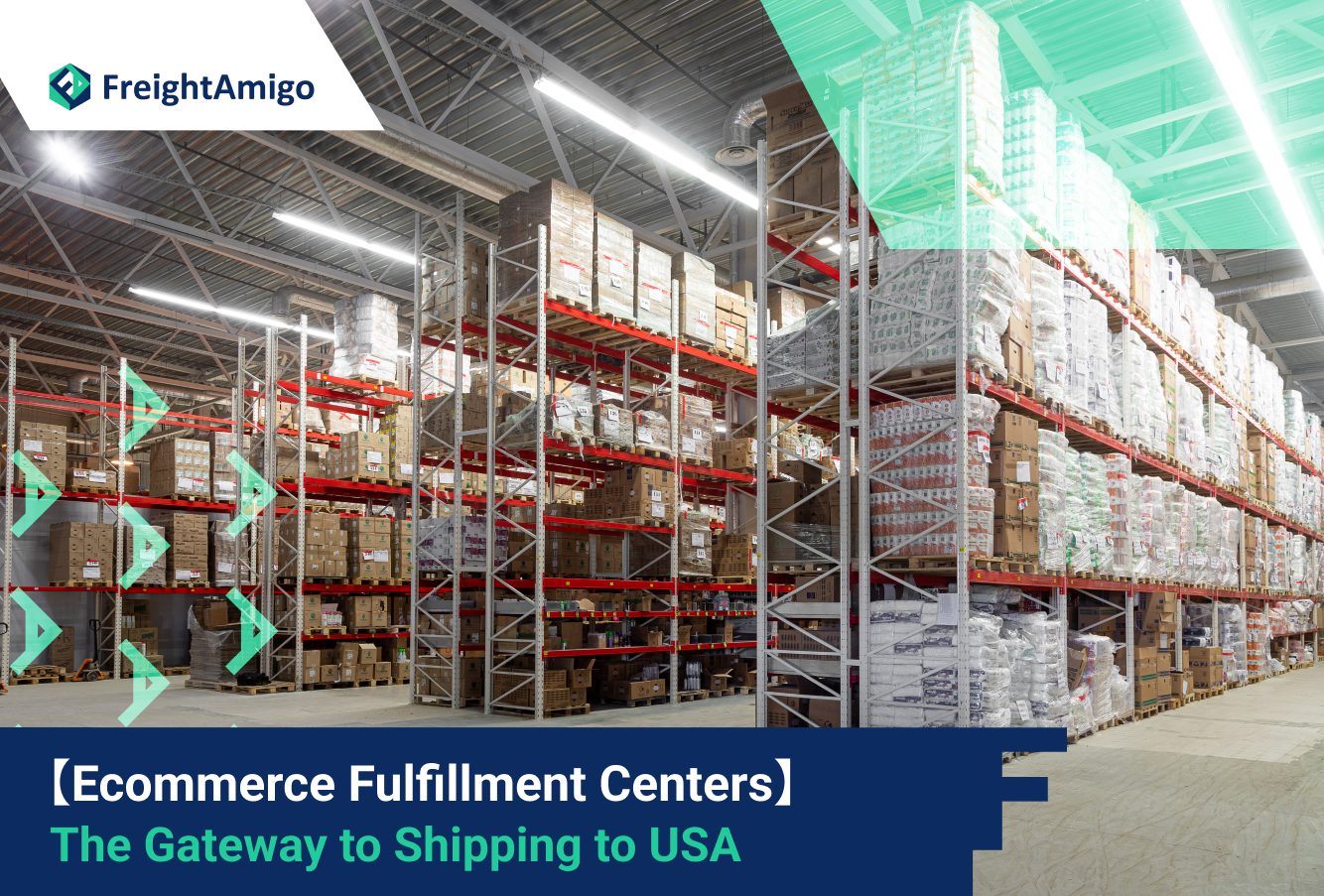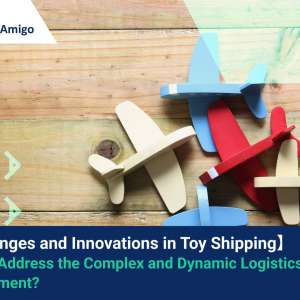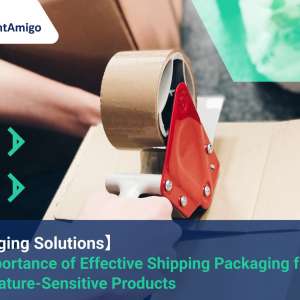Author Name: Tiffany Lee – Marketing Analyst at FreightAmigo
The ecommerce industry has witnessed astronomical growth over the past few years, with businesses of all sizes and sectors leveraging this platform to reach a global audience. A key element of this expansion has been the ability to ship products to customers across the world, especially to one of the largest consumer markets, the United States of America (USA). This article delves into the intricacies of ecommerce fulfillment centers, exploring how these hubs serve as a critical component in shipping to the USA.
Want To Compare The Best Express, Air Freight, Sea Freight, Rail Freight & Trucking Rates So As To Have Better Control On Cost?
What is Ecommerce Fulfillment?
Ecommerce fulfillment refers to the sequence of operations that kick into action as soon as a customer places an order online. This process encompasses a range of activities from inventory management, order picking, packaging, to the final step of shipping the product to the customer’s doorstep. Fulfillment centers, which are specialized warehouses, play a pivotal role in this process by providing the necessary infrastructure and services to manage these tasks efficiently.
The Ecommerce Order Fulfillment Process
The order fulfillment process in ecommerce is a journey that begins with the customer placing an order and ends with the successful delivery of the product. Here’s a step-by-step breakdown of this process:
- Inventory Receiving and Storage: The initial phase involves receiving the inventory from the suppliers or manufacturers and subsequently storing them in the fulfillment center. Each product is assigned a unique stock keeping unit (SKU) and a specific location within the warehouse for easy retrieval when an order is placed.
- Order Processing: Once a customer places an order, the fulfillment center receives and processes the order. This involves picking the right products from the inventory and preparing them for shipment.
- Packing and Shipping: The products are then packed securely and labeled for shipping. Fulfillment centers often work in collaboration with various shipping carriers, enabling them to manage bulk packages efficiently.
- Delivery and Returns: The packaged products are then shipped to the customer’s location. Fulfillment centers often provide tracking details to both the merchant and the customer for real-time updates. In case of any issues with the order, the customer can return the product to the fulfillment center, initiating a returns process.
Ecommerce Fulfillment Methods
Depending on the size and nature of the business, merchants can choose from various ecommerce fulfillment methods:
- Self-Fulfillment: Suited for small businesses and startups, self-fulfillment involves managing the entire fulfillment process in-house. From storing inventory to packing and shipping orders, businesses handle all tasks themselves.
- Third-Party Fulfillment: As businesses grow, managing fulfillment in-house may become challenging. In such cases, businesses can opt to outsource these tasks to third-party logistics (3PL) providers, who offer professional warehousing and fulfillment services.
- Dropshipping: In the dropshipping model, merchants act as intermediaries between the manufacturers or suppliers and the customers. When a customer places an order, the merchant forwards the details to the supplier, who then ships the product directly to the customer.
Benefits of Outsourcing Your Ecommerce Fulfillment
Outsourcing ecommerce fulfillment to a professional 3PL provider offers several advantages:
- Time Efficiency: Outsourcing fulfillment tasks to professionals can save businesses significant time, which can be better invested in growing the business.
- Cost-Effective Storage: Fulfillment centers provide businesses with cost-effective storage solutions, eliminating the need for businesses to rent or buy their own warehouse space.
- Wide Shipping Coverage: By partnering with fulfillment centers strategically located across different regions, businesses can ensure efficient and quick delivery of products to customers.
- Scalability: Outsourcing fulfillment allows businesses to scale their operations seamlessly as they grow.
Key Considerations When Choosing a Fulfillment Center
When evaluating potential fulfillment centers, businesses should consider the following factors:
- Location: The location of the fulfillment center is crucial as it can impact the speed and cost of delivery. Ideally, the fulfillment center should be close enough to meet the business’s needs without causing any logistical challenges.
- Services Offered: The range of services offered by the fulfillment center is another critical factor. This can include warehousing, order fulfillment, shipping services, returns management, and more.
- Scalability: The fulfillment center should be capable of scaling its services according to the growing needs of the business.
Key Players in the Ecommerce Fulfillment Space
Several prominent players in the market offer comprehensive ecommerce fulfillment services. Some of these include:
- Amazon Multi-Channel Fulfillment (MCF): Amazon MCF is a fulfillment service offered by Amazon for brands that sell outside of the Amazon Marketplace. They leverage Amazon’s extensive warehouse network to offer fast and reliable shipping services.
- Shopify Fulfillment Network: Designed for businesses with a Shopify store, the Shopify Fulfillment Network offers a centralized system of fulfillment centers that help reduce shipping costs and delivery times.
- FedEx Fulfillment: Known for its international shipping services, FedEx Fulfillment provides comprehensive fulfillment and warehousing solutions. They offer a variety of shipping and transportation options to their clients.
- ShipBob: A popular fulfillment service for both DTC and B2B companies, ShipBob offers a network of fulfillment centers across the US and Canada, ensuring fast and efficient delivery of products.
- Red Stag Fulfillment: Red Stag Fulfillment specializes in fulfilling orders with a high degree of accuracy and offers same-day shipping, making it a reliable choice for ecommerce businesses.
Conclusion
Partnering with a professional ecommerce fulfillment center can greatly streamline the process of shipping to USA for businesses. Not only does it ensure efficient and timely delivery of products, but it also frees up valuable time and resources for businesses to focus on their core operations. However, choosing the right fulfillment center requires careful consideration of various factors such as location, services offered, and scalability. With the right fulfillment partner, businesses can effectively bridge the gap between their products and their customers, driving growth and customer satisfaction in the process.
There Are Different Options For Cargo Transportation. If You Want To Choose The Most Convenient And Suitable Solution, It Is Best To Have The Full Support Of Logistics Experts! If You Are Planning To Ship Goods Overseas, Please Go To The FreightAmigo Page For Inquiries.
===
Read More:
【Cosmetic Product Recycling】 A Guide to Sustainable Reverse Logistics
【Rise of Green Supply Chain】 Pioneering Sustainable Practices in Logistics
【ESG in Logistics】 How ESG Practices Drive Social Responsibility in Logistics
===
If you have any inquiries on logistics/supply chain, feel free to contact FreightAmigo now:
Chat with us online OR
Phone : +852 28121686
WhatsApp: +852 27467829









































